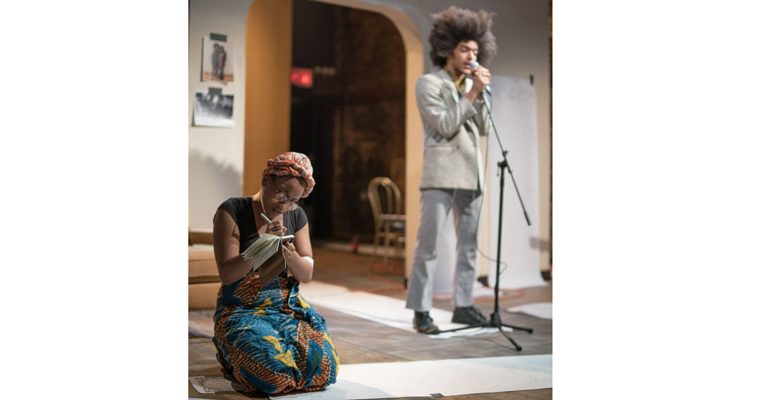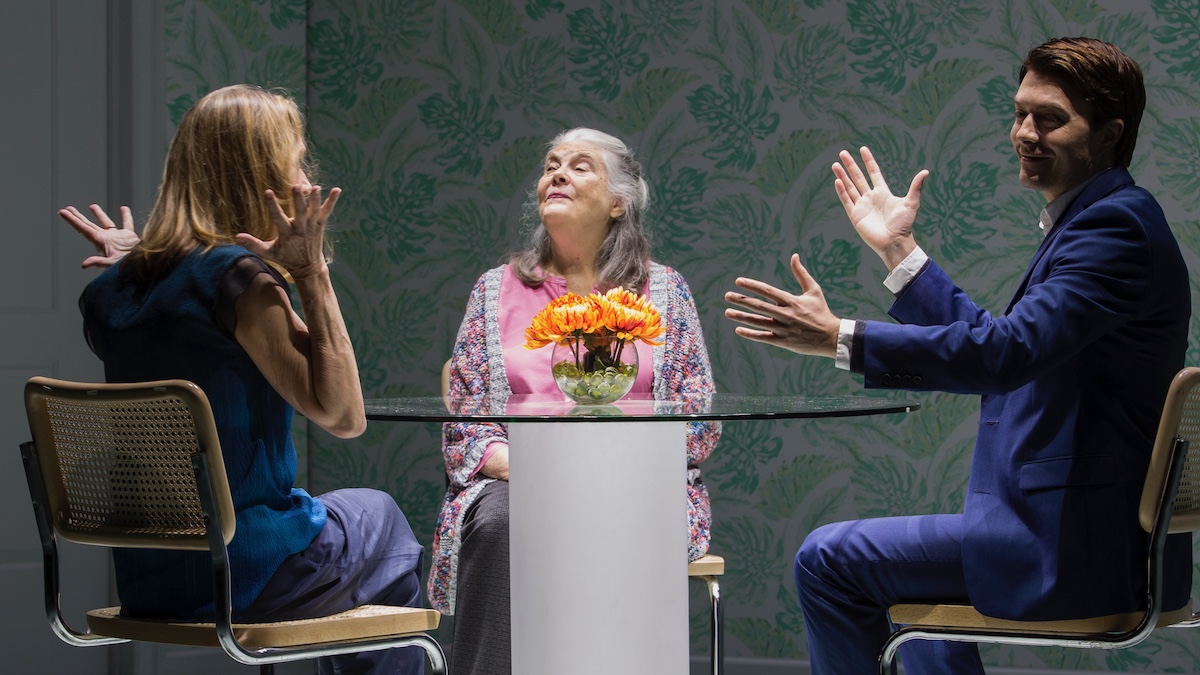
Writers – playwrights, poets, and filmmakers alike – often play with the constraints of time by creating warped worlds, worlds in which characters interact with time and space in unreal ways. They achieve these worlds by progressing non-linearly, offering alternate physical planes of existence, going to space. However, it is a rare writer who can conceptualize a world existing both in and out of “the real” by letting their audience inhabit the one thing that makes these worlds possible at all – a character’s mind. Playwright Adrienne Kennedy does just that.
I had the honor of being cast as Suzanne in Kennedy’s She Talks to Beethoven for The New School’s annual AlumNight performance, curated by La MaMa’s director-in-residence, Zishan Ugurlu. She Talks to Beethoven is an avant-garde piece set in recently post-independence Ghana. Suzanne Alexander, the show’s protagonist, awakens from a mysterious surgery to find that her husband, David, has disappeared. In his absence, Suzanne conjures up the presence of her latest play’s leading character, Beethoven. Throughout, he is either reassuring Suzanne of David’s safety or taking her mind off of David completely by questioning her about the progress of her play. Suzanne’s only links to the physical world are the books and diaries – her research on Beethoven – that surround her; the abstracted sounds of Ghanaian music coming in from “outside”; and her radio, broadcasting updates on David’s whereabouts and conspiracies surrounding his disappearance, his ties to Frantz Fanon, and his revolutionary teachings.
Suzanne is torn between three different realities: 19th Century Austria with Beethoven, 1960s Ghana with David, and the conflation of the two – which exists in her mind and probably out of time. In this way, Suzanne (and Kennedy) disrupts time and space. Is this the actual ghost of Beethoven, or just the character she has created for her new play? My director chose to have David, Suzanne’s missing husband, onstage throughout the play. Though I as Suzanne never saw him, I did hear him – his voice in my head, rather – and interact with his voice in the space. His voice would draw me to or away from different corners of the stage (Kennedy makes it possible to reimagine her work in many absurdist ways). However, regardless of whether David is present in any other production of She Talks to Beethoven, his ghost is still in the room in the form of news of him over the radio and conversations between Suzanne and Beethoven. The air is thick with illusions/delusions.
And just as Suzanne is torn, so are the countries she occupies both physically and mentally. The play opens with Suzanne reading a passage from a published diary of Beethoven’s, “The production of Fidelio was anticipated by months of increasing tension as the war with Napoleon escalated…At Ulm on 20 October the Russians conceded defeat to the French” (Alexander, 5). This is the political context that awakens Beethoven to Suzanne – The War of the Third Coalition, Austria’s defeat to the French. Perhaps focusing on another’s turmoil lets her create distance from Ghana’s post-independence unrest, which led to David’s disappearance. Throughout the play, though, Suzanne imagines parallel situations from Beethoven’s life. War. Loss. At the height of Suzanne’s worrying, she reads and remembers Beethoven’s relationship with his nephew Karl, “the only person Beethoven really loved to the point of idolatry” (Alexander, 12). In this scene, Karl tries to shoot himself, but when Beethoven goes to see him, Karl refuses to see or talk to him. Suzanne gifts herself this friend in Beethoven, someone who will be able to empathize with her because he has clearly felt what she feels.
But what does it mean to disrupt time and space? It means everyone has to work a little harder to put the pieces together. The most intriguing part of playing Suzanne in Kennedy’s She Talks to Beethoven was wrapping my own writer’s brain around inhabiting someone else’s mind. I had to abandon my preconceived notions of what playing with time means to me as a writer, or the ways in which I’ve done it in my own work, because time functions so differently for everyone; what feels like an hour to one person may feel like a whole day to another. And for Suzanne, what feels urgent and now also feels like yesterday and forever. She talks to Beethoven as if he has always been there, though it is clear by the end of the play that he has only been there the length of one day. Disrupting time and space means having to look beyond them to find meaning. It is more important to the show that we feel Suzanne’s fear due to how much time has gone by without word from David than it is that we understand exactly how time functions in her mind.
More importantly to me, though, is the question around what it means to be disruptive as a Black woman writer. Often, I feel, Black women writers have to put the real in absurdist worlds so that audiences that live outside of our communities can see that the absurdity exists outside of the theater as well. No, Beethoven was not in Suzanne’s bedroom in Accra in 1961 – that is not real. But what is real is the pressure to create more work even when you feel like your world is falling apart, even when you don’t know where your loved ones are or if they’re even alive. What is real is a Black woman feeling loss, fear, and pain and not having a space or outlet outside of her home where she can cope.
In the end, it turns out that David had not been kidnapped, but had instead decided to flee in an attempt to avoid his potential captors and to protect Suzanne. Her last words in the play are “David, you sent Beethoven to me while you were absent, didn’t you?” (Alexander, 23). In the last moments, Suzanne disrupts time and space yet again. In her mind, David, who has been absent before the play even begins, has sent Beethoven to help her cope in David’s absence. So, the ghost of one man conjures the ghost of another. These ghosts, only one of whom is actually dead, co-exist then, in a space outside of Suzanne’s home and mind. Kennedy leaves her audience with so many questions, the final one being: Is it possible that in the many worlds that might exist, that those we love and those we need conspire to journey to us in our time of need? Is it possible that none of this was ever just happening in Suzanne’s head? Is it possible that, wherever David was, he really did ask Beethoven to go to his wife?
To purchase a copy of She Talks to Beethoben, click here, and to learn more about licensing a production, click here.

Plays About Technology

Newly Available for Licensing – December 2025 (US)

